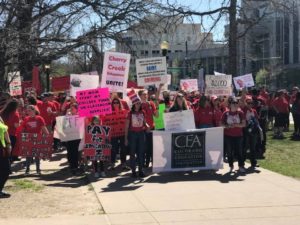‘We don’t sue enough of our public schools,’ says education reform expert
Public education all over America is failing, including in California with its poor test scores and the worst literacy rate in the nation.
A proposed constitutional initiative submitted to…

Public education all over America is failing, including in California with its poor test scores and the worst literacy rate in the nation.
A proposed constitutional initiative submitted to California’s Legislative Analyst’s Office in December might help – a move which would “establish the right to a high-quality public education” and establish a stronger basis for holding schools accountable.
The movement was sparked by a lawsuit in 2016 – Vergara v. California – in which nine students sued the state for providing them with “grossly ineffective” teachers. The complaint also alleged these teachers were disproportionately assigned to poor and minority students.
However, the California Constitution doesn’t recognize the right to a quality education, merely a “free” one, so the students lost their case.
Lance Christensen, vice president of education policy and government affairs at the California Policy Center, told The Lion the initiative will need to get roughly 1 million signatures to get on the ballot in 2024.
However, if an influential organization like the California Teachers Association (CTA) were to oppose the initiative, it could become very expensive.
“The teachers union is the most powerful union in the entire state,” said Christensen. “If you were to have them step up and oppose this then it would have a really difficult challenge of getting passed without a substantial amount of money being raised for it.”
Teachers’ unions have fallen from public grace, as education experts denounce their harmful effects on students, and teachers themselves flee the increasingly politicized groups.
California Policy Center even started the Janus Project to help government employees understand their rights regarding unions.
“They [the teachers] have got to shed this idea that the California Teachers Assocation knows their head from a hole in the ground. And you can quote me on that,” said Christensen. “They [the unions] don’t know a thing about education.”
Christensen blames CTA for the retention of bad teachers that spoil the barrel. Since unions protect ineffective teachers from being fired, they are often reassigned to different schools – usually the low-income schools.
“I would like to see the union stripped of its powers to protect terrible teachers. I would love to compensate teachers at a higher rate,” said Christensen. “I think if you do that, you effectively will have a high-quality public education.”
Another avenue to high-quality education is school choice, which teachers’ unions vehemently oppose.
“We have a legislature that is bought and paid for by the California Teachers Association. And they do not, I repeat, like any competition in education policy,” said Christensen.
Nonetheless, he describes the prevailing pedagogy of public schools as “absolutely backwards” and recommends Emily Hanford’s Sold a Story podcast, which investigates why schools use teaching practices that were “proven wrong by cognitive scientists decades ago.”
Now, the consequences of those practices are painfully real – “children harmed, money wasted, an education system upended,” reads a description of the podcast.
Despite spending over $20,000 per student, only 77% of California’s adults are mid- to highly literate.
The proposed constitutional initiative isn’t a panacea for all public education woes, but supporters say it would give 5.9 million California students and parents solid legal ground to stand on in the fight for high-quality education.
“After traveling the state for the last two years working on education reform, we don’t sue enough of our public schools,” concluded Christensen. “I think if we sued more of them they would take these things seriously.”



